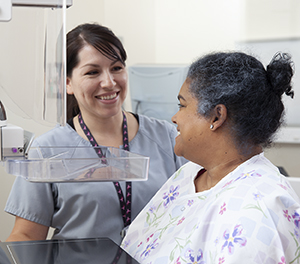What are the benefits of screening mammography?
Today's high-quality screening mammogram is the best tool available to detect breast cancer before lumps can be felt or symptoms appear. You have a better chance of surviving breast cancer if your healthcare provider finds and treats it early, while it’s small and hasn’t spread. Screening doesn't guarantee that you won't get cancer or die from it, especially if it's found after it has spread. But regular screening may help find the cancer earlier.
Is there a risk of radiation exposure from having regular mammograms?
You may want to ask your healthcare provider about the amount of radiation used during the procedure. Ask about the risks related to your particular case. Special care is taken to make sure that the lowest possible amount of radiation is used when you have a mammogram.
What should you expect when having a mammogram?
Don't use deodorant, powder, or lotions on the day of your mammogram. Wear 2-piece clothing. A specially trained radiology technologist will do the X-ray. The technologist will ask you to undress, put on a gown, and stand next to the X-ray machine. Two flat surfaces (plates) are slowly squeezed together. They compress each breast for a few seconds. This compression may be somewhat painful. But it's needed to make the best pictures using the lowest amount of radiation possible.
Are mammograms painful?
You may find the pressure of the plates on the breasts to be uncomfortable or even painful. Timing your mammogram when your breasts are not tender is important. In premenopausal people, this is usually 1 week after your menstrual period. If you do have discomfort or pain, ask the technologist to reposition you to try to make it as painless as possible. Remember that each X-ray takes just a few moments and could save your life.
Who pays for mammography?
The Affordable Care Act dictates that mammograms for breast cancer screening be given without a co-pay or deductible beginning with plan years that started after Aug. 1, 2012. But health plans that were in place before the act was passed (grandfathered plans) don't have to cooperate. Those plans are covered by various state and federal laws. Medicare covers annual mammography screenings for people ages 40 and older. Most states now require that health insurance policies offer mammography screening reimbursement. Many mammography facilities also offer special programs and lower fees during National Breast Cancer Awareness Month in October. Because of ongoing attempts to change the ACA, check with your health insurance provider before setting up an appointment.
For low-income people, mammograms are covered through the National Breast and Cervical Cancer Early Detection Program. For more information, contact your state department of health.
Featured in


